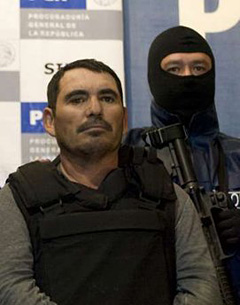
|  |  |  News Around the Republic of Mexico | January 2009 News Around the Republic of Mexico | January 2009  
Mexico Could Collapse, U.S. Analysts Say
 Los Angeles Times Los Angeles Times
go to original


| | Mexican drug suspect Santiago Meza (L), known as "El pozolero" (The Stew Maker), is presented to the media in Mexico City January 25, 2009. Meza confessed to dissolving the bodies of 300 rivals with corrosive chemicals near the U.S. border, in a shocking claim even by the standards of Mexico's brutal drug war. (Reuters/Jorge Dan Lopez) |  |
Mexico City - Stark assessments about the threat that drug crime poses to Mexico's stability have put the government of President Felipe Calderon on the defensive as he tries to forge a relationship with a new U.S. president.

Spiraling violence, spurred in part by Calderon's two-year-old offensive against drug traffickers, has prompted some officials and analysts in the United States to warn that Mexico faces a risk of collapse within several years.

The U.S. Joint Forces Command, a military command, recommended that Mexico should be monitored alongside Pakistan as a "weak and failing" state that could crumble swiftly under relentless assault by violent drug cartels.

Retired U.S. Army Gen. Barry McCaffrey, the former U.S. drug czar, said in a separate analysis that the Mexican government "is fighting for its survival against narco-terrorism" and could lose effective control over large swaths near the U.S. border. The outgoing CIA director, Michael Hayden, listed Mexico next to Iran as a possible top challenge for President Barack Obama. And former U.S. House Speaker Newt Gingrich predicted this month that Mexico could turn into a surprise crisis for the new president by year's end.

The assessments come as Calderon seeks to claim gains in his government's fight against drug traffickers, a campaign that has aggravated violent feuding among gangs vying to supply the lucrative U.S. market for narcotics. More than 5,300 people died in Mexico last year in drug-related violence.

Mexican officials and most analysts here scoff at depictions of Mexico as a failed or failing state. They say it bears little resemblance to hopeless situations such as those in Somalia, Haiti or Sudan, with their weak central governments, sectarian blood-letting or fleeing refugees.

"It's a very bad analysis," said Raul Benitez, an expert on security and U.S.-Mexico relations at the National Autonomous University of Mexico. "Mexico has some failed institutions inside the government, but not the whole state."

Few people deny that lawlessness prevails in cities including Ciudad Juarez and Tijuana, and that corruption has chewed deep into law-enforcement agencies and the courts. Still, many analysts say, the government's basic authority remains intact in most of the country, and the daily violence is nothing like that of a civil war.

But the darker assessments have put Calderon administration in the awkward position of making a strong enough case for increased U.S. help while staving off the kind of talk that could scare off tourists and foreign investors.

"These analyses are a big strike against Calderon," Benitez said. "He wants the attention, but not the attention for the bad things." |

 |
|  |



